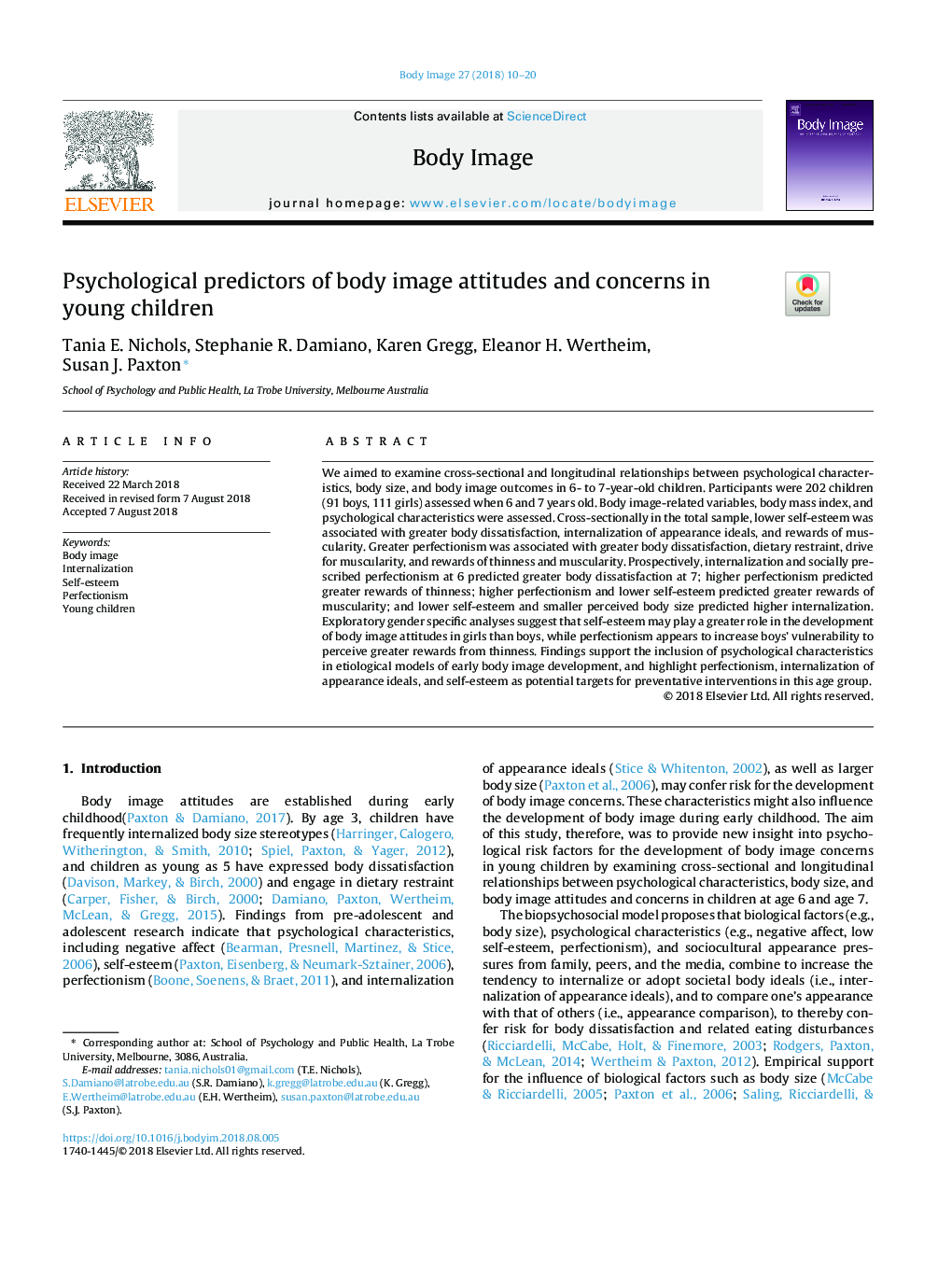| کد مقاله | کد نشریه | سال انتشار | مقاله انگلیسی | نسخه تمام متن |
|---|---|---|---|---|
| 7262905 | 1472803 | 2018 | 11 صفحه PDF | دانلود رایگان |
عنوان انگلیسی مقاله ISI
Psychological predictors of body image attitudes and concerns in young children
ترجمه فارسی عنوان
پیش بینی های روان شناختی نگرش ها و نگرش های تصویر بدنی در کودکان جوان
دانلود مقاله + سفارش ترجمه
دانلود مقاله ISI انگلیسی
رایگان برای ایرانیان
کلمات کلیدی
تصویر بدن، داخلی سازی، اعتماد به نفس، کمال گرایی، بچه های جوان،
ترجمه چکیده
هدف ما بررسی روابط مقطعی و طولی بین ویژگی های روانی، اندازه بدن و نتایج تصویر بدن در کودکان 6 تا 7 ساله است. شرکت کنندگان 202 کودک (91 پسر، 111 دختر) در سن 6 و 7 سالگی مورد ارزیابی قرار گرفتند. متغیرهای مرتبط با بدن، شاخص توده بدنی و ویژگی های روان شناختی مورد ارزیابی قرار گرفتند. به طور متقاطع در کل نمونه، عزت نفس پایین تر با نارضایتی بیشتر بدن، درونی کردن آرمان های ظاهر و پاداش های عضلانی همراه بود. کمال گریزی بزرگ با نارضایتی بیشتر بدن، محدودیت غذا، رانندگی عضلانی و پاداش هایی از لکنت و عضلات همراه شد. به طور چشمگیری، درونی سازی و کمال گرائی اجتماعی تجویز شده در 6 سالگی، نارضایتی بیشتر بدن را در 7 سالگی پیش بینی کرد؛ کمالگرایی بالاتر، پاداش های بزرگتری از لکنت را پیش بینی کرد؛ کمالگرایی بالاتر و عزت نفس پایین، پاداشهای بیشتری از عضله را پیش بینی می کنند؛ و عزت نفس پایین و اندازه ذهن کوچکتر درک شده، پیش بینی کننده درونی شدن بیشتر بود. تجزیه و تحلیل های خاص جنس اکتشاف نشان می دهد که اعتماد به نفس می تواند نقش بیشتری در توسعه نگرش های تصویر بدنی در دخترها نسبت به پسران داشته باشد، در حالی که کمال گرائی به نظر می رسد آسیب پذیری پسران را در درک بهتر پاداش از لکنت افزایش دهد. یافته ها از درج ویژگی های روانشناختی در مدل های عقلی پیشرفت تصویر بدنی حمایت می کنند و از کمال گرایی، درونی سازی آرمان های ظاهر و اعتماد به نفس به عنوان اهداف بالقوه برای مداخلات پیشگیرانه در این گروه سنی حمایت می کنند.
موضوعات مرتبط
علوم پزشکی و سلامت
پزشکی و دندانپزشکی
روانپزشکی و بهداشت روانی
چکیده انگلیسی
We aimed to examine cross-sectional and longitudinal relationships between psychological characteristics, body size, and body image outcomes in 6- to 7-year-old children. Participants were 202 children (91 boys, 111 girls) assessed when 6 and 7 years old. Body image-related variables, body mass index, and psychological characteristics were assessed. Cross-sectionally in the total sample, lower self-esteem was associated with greater body dissatisfaction, internalization of appearance ideals, and rewards of muscularity. Greater perfectionism was associated with greater body dissatisfaction, dietary restraint, drive for muscularity, and rewards of thinness and muscularity. Prospectively, internalization and socially prescribed perfectionism at 6 predicted greater body dissatisfaction at 7; higher perfectionism predicted greater rewards of thinness; higher perfectionism and lower self-esteem predicted greater rewards of muscularity; and lower self-esteem and smaller perceived body size predicted higher internalization. Exploratory gender specific analyses suggest that self-esteem may play a greater role in the development of body image attitudes in girls than boys, while perfectionism appears to increase boys' vulnerability to perceive greater rewards from thinness. Findings support the inclusion of psychological characteristics in etiological models of early body image development, and highlight perfectionism, internalization of appearance ideals, and self-esteem as potential targets for preventative interventions in this age group.
ناشر
Database: Elsevier - ScienceDirect (ساینس دایرکت)
Journal: Body Image - Volume 27, December 2018, Pages 10-20
Journal: Body Image - Volume 27, December 2018, Pages 10-20
نویسندگان
Tania E. Nichols, Stephanie R. Damiano, Karen Gregg, Eleanor H. Wertheim, Susan J. Paxton,
